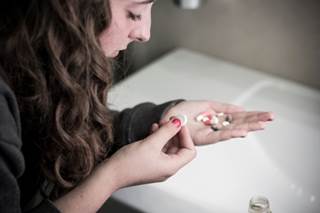
The Short of It
Doctors are warning parents that their teens could be using unregulated supplements as appearance enhancers.
The Lowdown
Pediatricians from the U.S. Council on Sports Medicine and Fitness are warning parents about
teens using risky, unregulated supplements to improve their looks. Teens are using things like protein powders, steroids and diet pills, which the American Academy of Pediatrics says are at best, useless, and at worst, toxic.
Based on a survey of students in grades 8 through 12, 20 percent of the boys said they take protein supplements; one in five use creatine,
which reportedly revs up energy in cells; and a scary 5 to 7 percent are using steroids.
“Doctors think of performance-enhancing substance use as an athlete problem, but
many non-athletes are using these substances for appearance enhancement,” says report co-author Dr. Michele LaBotz.
While boys tend to go for protein supplements, caffeine, steroids, and creatine, nonprescription weight-loss supplements are popular with girls. It’s the over-the-counter supplements—deregulated in 1994—that the kids are turning to, and according to LaBotz, studies have shown that many of them are contaminated with toxic heavy metals, such as lead and mercury, or mixed with steroids and stimulants, like amphetamines.
“Substances spiked with stimulants put you at
higher risk for cardiovascular problems,” LaBotz explains. “If you are one of the many teens already on stimulants for ADHD, you’re compounding the risk of heart problems.”
And the effects of steroids are even worse. “A lot of the effects of steroids are irreversible, including stunted growth and the growth of male breasts,” LaBotz adds. “These don’t go away when you stop putting steroids in your body.” Not to mention the fact that suddenly stopping them can lead to depression and heightened risk of suicide, she notes.
Scary stuff! That’s why the AAP is now urging doctors to educate parents and teens about the dangers of these supplements in order to discourage their use.
The Upshot
When I was in high school, Dexatrim was all the rage. It was supposed to be an OTC weight loss miracle pill—and my 10th grade self couldn’t wait to try it. I remember buying a box at the local drugstore, then sneaking it into my room to tear open the box and pop a pill, envisioning myself suddenly turning into Catherine Bach with her teeny tiny Daisy Dukes. But my excitement was short lived because about an hour later I came down with a serious case of the shakes. Plus, I felt heart palpitations and had a weird, aluminum taste in my mouth.
I quickly buried the box in the trash and moved on. But now, thanks to the internet, there is more pressure than ever for our kids to look a certain way, making it imperative for us as parents to sit down and talk to them about the dangers of using this stuff.
“[Parents] have a lot of influence,” LaBotz explains. “They should
know what their teens are takingand should discourage the use of supplements.”
http://www.parenting.com/news-break/teens-are-using-risky-supplements-to-improve-their-appearance
